Table of Contents
The importance of economics cannot be overemphasized. Basically, it is the study of how societies make efficient use of scarce resources.
By studying how markets work, people also learn how to make efficient choices in managing their own scarce resources, such as time and money.
Proper knowledge of economics molds you into a better consumer, manufacturer, and trader with enhanced decision-making capability. You’re able to control your expenditure in relation to your income, which results in maximum satisfaction.
If you’re looking to become a renowned economist, here are the 11 best economics books that will help you actualize your dream:
1. Basic Economics: Common Sense Guide to the Economy – Thomas Sowell
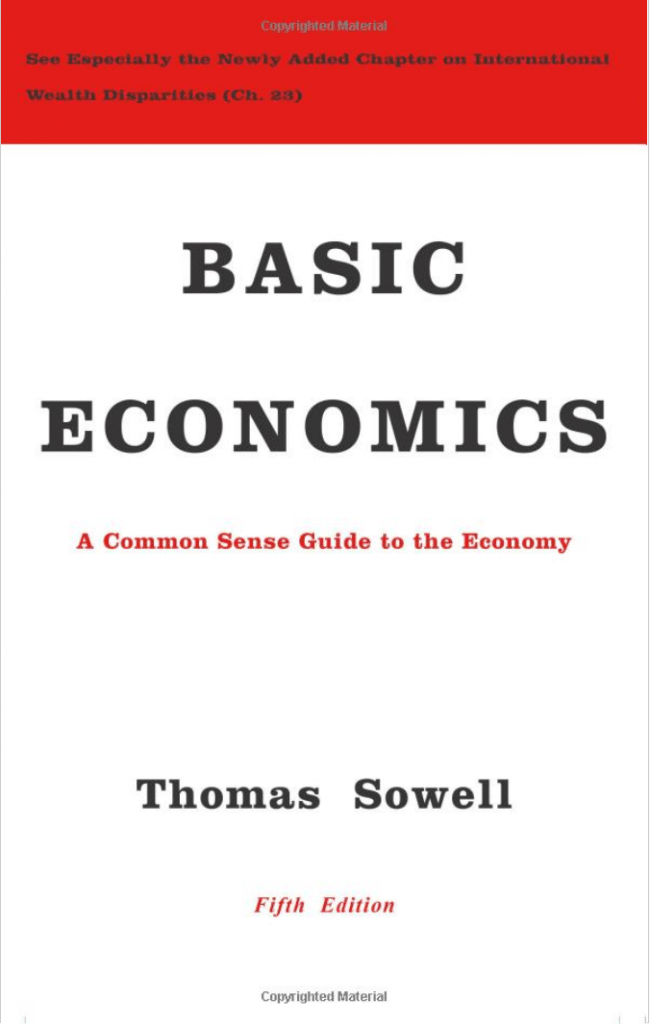 Basic Economics is a popular economics book written by Thomas Sowell. Thomas has been writing for 4 decades now.
Basic Economics is a popular economics book written by Thomas Sowell. Thomas has been writing for 4 decades now.
He breaks down complex topics and subjects into easy to digest information.
Most people love his books because he evokes a lot of emotions out of conversations and breaks things down logically using statistics and numbers.
One of the most motivational lines he uses in the book is “Don’t tell me about your intentions, show me your results.” In this day and age, this is an important quote to keep.
Face it; people can have really great intentions, but executing them can be a challenge. Or if they do, they don’t result in success.
The book might look intimidating initially, but when you peruse it, you find that it’s broken down into relatively easy to read chapters, without statistics, graphs or jargon. Plus, information within the chapters is broken down into manageable and easy to read ideas.
The book talks about the basic economic concepts that are important in today’s world and explains them really well. He delves into the fundamental economic principles and ways in which they explain and impact our day-to-day lives.
Besides updating the latest version, basic economics has been customized to appeal to the global audience by incorporating economic problems from different countries across the world.
The author understands that economic problems are not limited to one country. Ideally, the book highlights experiences of various people and cultures.
2. Principles of Economics – Carl Menger
 Principles of Economics is a book written by Carl Menger, who was a revered economist. The book has long been known to have played a key role in the founding of the Austrian School of Economics. It’s known to have heralded the new age of economics.
Principles of Economics is a book written by Carl Menger, who was a revered economist. The book has long been known to have played a key role in the founding of the Austrian School of Economics. It’s known to have heralded the new age of economics.
The book revolutionized price, value and marginal utility theories. Also, it was the go-to textbook for students and scholars in Austria to learn economics.
The major topics covered in this book include the general theory of the good, economy and economic goods, the theory of value, the theory of exchange, use value and exchange value, the theory of the commodity, and the theory of the money.
3. Economics in One Lesson – Henry Hazlitt
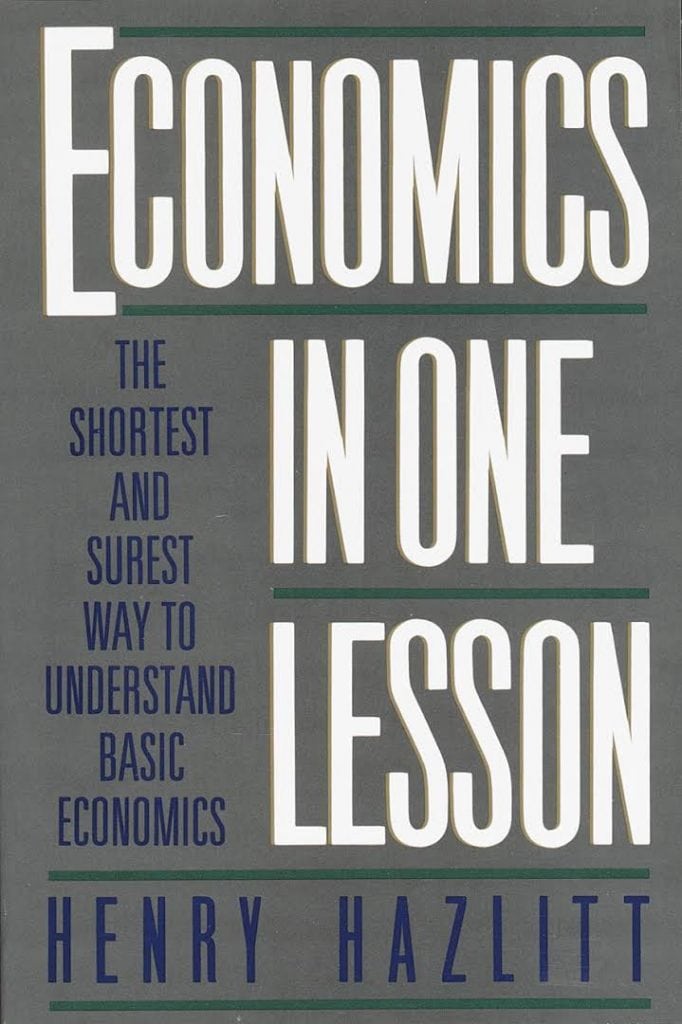 Written by Henry Hazlitt, Economics in One Lesson presents the shortest and surefire way to learn the basic of economics. Initially published in 1946, it sheds light on various aspects of economics and has changed the way many people in the world think about economics.
Written by Henry Hazlitt, Economics in One Lesson presents the shortest and surefire way to learn the basic of economics. Initially published in 1946, it sheds light on various aspects of economics and has changed the way many people in the world think about economics.
The contents of the book have a great impact on the perspective of many people today about the present economy. In the course of reading this book, you’ll find out that Henry Hazlitt advances a libertarian approach to economic thinking.
The book has 26 chapters and is divided into 3 parts. Some of the chapters explain the workings of the price system, the lesson after 30 years, the mirage of inflation, answers on the ability of unions to raise wages, if taxes discourage production, the definition of rent control and what it does, drive for exports, government price fixing and much more.
This is the best book if you want to know how the economy really works.
4. Day to Day Economics – Satish Y. Deodhar
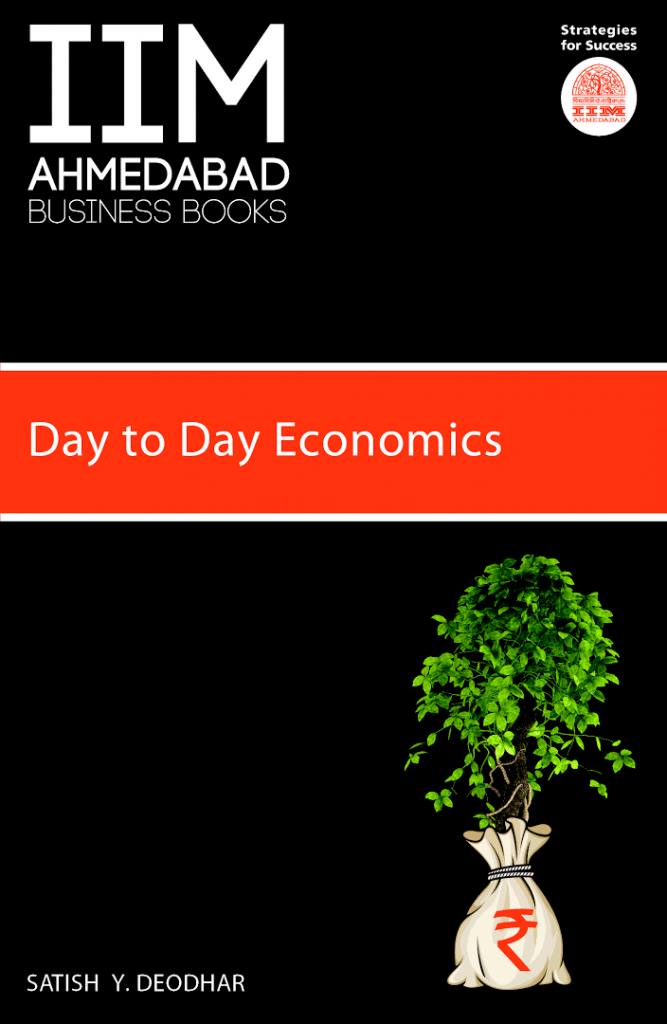 Day to day economics is a book written by Satish Y. Deodhar, an author and a respected professor in the economics niche.
Day to day economics is a book written by Satish Y. Deodhar, an author and a respected professor in the economics niche.
It explains, in a simple way, the rules and concepts of economics out there. It’s actually a great book for those who don’t have prior knowledge of basic economic principles.
The book explains that unexpected and inexplicable change in a nation’s economy can impact the earning power of the average person, as well as their spending power.
It can also impact the nature of employment market, the prices of commodities, the overall business environment and more. Ideally, this book lets people know the factors that drive any country’s economy.
The introduction flies over every chapter in the book.
Chapter one talks about economic institutions, the various roles of the government, as well as private sectors, the importance of drawing up specific areas where the government and private sectors will control and operate in.
Chapter two talks about government budgets and deficits and how they impact the average citizen. It addresses, in details, the different aspects of taxation, budget and budget deficits.
Chapter three focuses on stock markets and banks. Specifically, it explains how stock market fluctuations impact a country’s economy. It also delves into how the banking industry works and how it’s governed.
Chapter four looks critically at the free trade concept and how institutions like World Trade Organizations operate and how they impact the global economy.
The next chapter delves into the reasons for an increase in the price of essential goods, how inflation works, and the main reasons prices of food increase.
The following chapter explains all the factors that impact economic growth, as well as recession.
Chapter seven focus on fiscal and financial policies and points out the factors that impact a country’s economic growth
Chapter eight basically summarizes all the chapters and gives the final observation
With multiple related case studies and illustrative examples, a glossary of common economic terminology, and definitions at the tail end, this is a must-read book if you want to thoroughly acquaint yourself with the world of economics.
5. Naked Economics: Undressing the Dismal Science – Charles Wheelan
 Charles Wheelan is an American economist, author, founder and founder and co-chairman of The Centrist Project.
Charles Wheelan is an American economist, author, founder and founder and co-chairman of The Centrist Project.
This is a book you may be unable to put down. In today’s constantly changing economic environment, this book is more than a good read for students and general readers alike.
It’s an investment that guarantees an impressive rate of return. It debunks the buzzwords in the economics niche, unravels the truths about oft-quoted numbers and answers all the relevant questions that you’ve been shy to ask. All that makes it an invaluable resource to know almost everything about economics.
The latest edition is revised and updated to include commentary on trending topics, such as globalization, current economic crisis, and the economics of information, the line between politics and economics, as well as the history and future of the Federal Reserve.
6. The Wealth of Nations – Adam Smith
 The Wealth of Nations was initially published in 1776 and is now considered the bedrock of modern economic thought. It was written by Adam Smith, a Scottish economist and professor of moral philosophy.
The Wealth of Nations was initially published in 1776 and is now considered the bedrock of modern economic thought. It was written by Adam Smith, a Scottish economist and professor of moral philosophy.
It’s the first book that provides a combination of descriptions of what is responsible for building nations’ wealth in the modern day.
It’s well-known as one of the best books in classic economics. The book reflects on economic situations during the start of the industrial revolution and centers on broader topics, such as productivity, division of labor, as well as free markets.
7. The Affluent Society – John Kenneth Galbraith
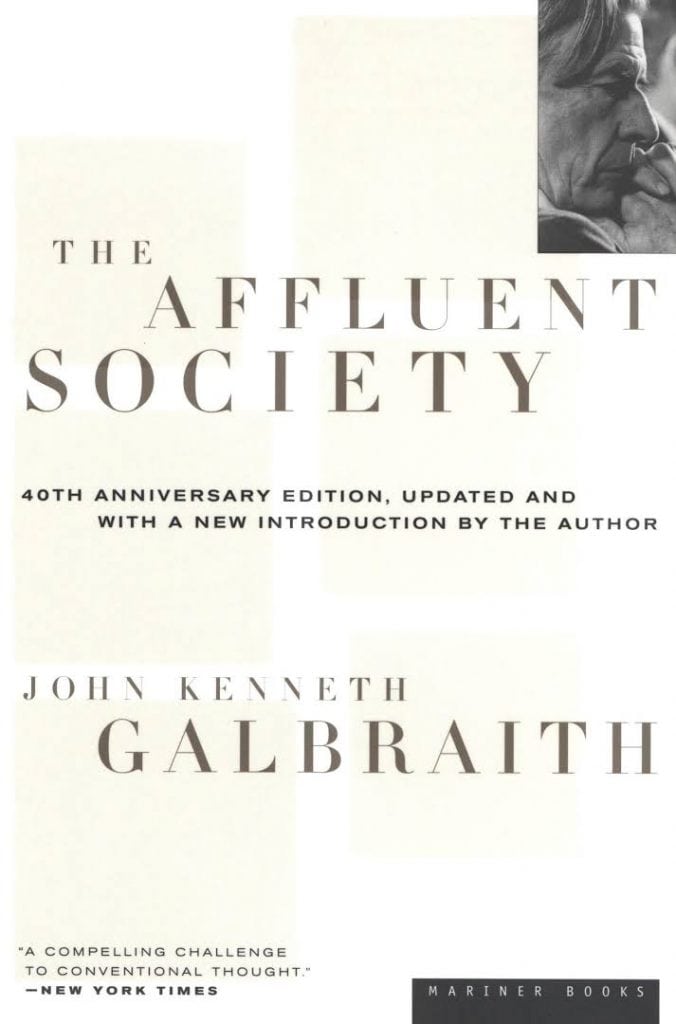 The Affluent Society is a book written by John Kenneth Galbraith, a famous Harvard economist. It was originally published in 1958, but the latest edition (4th) is an updated version.
The Affluent Society is a book written by John Kenneth Galbraith, a famous Harvard economist. It was originally published in 1958, but the latest edition (4th) is an updated version.
It takes a look at how the post World War II private sector America was rapidly becoming wealthy, while the public sector stagnated.
The private sector lacked social and physical infrastructure and this accelerated income disparities. This book evoked a lot of debate during the time and that’s how the term “conventional wisdom’’, coined by Galbraith became popular.
8. Economics for the Common Good – Jean Tirole
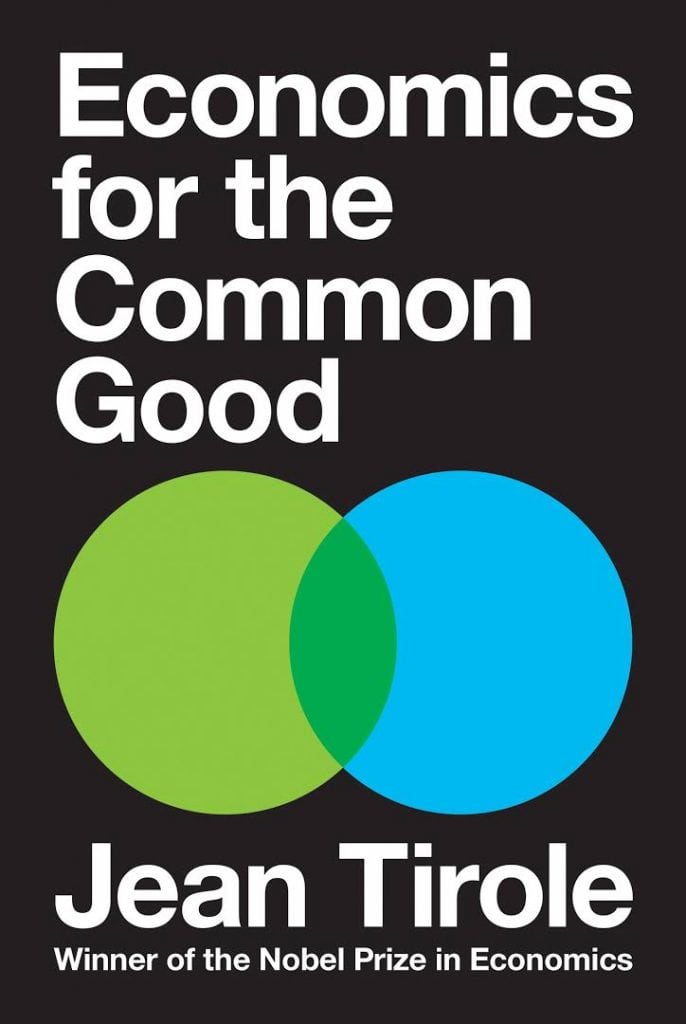 Jean Tirole, is a Nobel Prize-winning economist. He covers the role of economics in society in the book. Jean Tirole recognizes that economics is a positive and powerful force for the common good.
Jean Tirole, is a Nobel Prize-winning economist. He covers the role of economics in society in the book. Jean Tirole recognizes that economics is a positive and powerful force for the common good.
He is of the view that economists should not only be rewarded for crafting technical research papers in scholarly journals, but also for engaging with the numerous challenges that face today’s society, and for playing a significant role in finding solutions to address them.
Tirole goes further to point out how economics can be a great force to help people achieve the common good. He also shares his view on a wide range of questions impacting our day-to-day lives, as well as the future of the society, such as unemployment, global warming, the euro crisis, the post-2008 global financial order, innovation, the digital revolution, and right equilibrium between regulation and the free market.
In a nutshell, Economics for the Common good expounds on how everyone can benefit from economics.
9. The Road to Serfdom – Friedrich von Hayek
 Friedrich von Hayek is an Austrian British economist, and philosopher. The Road to Serfdom is a classic resource that centers on political philosophy, cultural and intellectual history and economics. It has antagonized and inspired a lot of people in society, including scholars, general leaders, and politicians for about half a century.
Friedrich von Hayek is an Austrian British economist, and philosopher. The Road to Serfdom is a classic resource that centers on political philosophy, cultural and intellectual history and economics. It has antagonized and inspired a lot of people in society, including scholars, general leaders, and politicians for about half a century.
The book was initially published in England in 1944, by the University of Chicago press and it was respected for its warning against the perils of state-controlled production.
The author shows why the idea of empowering the government or centralizing resources could culminate in scenarios like the Nazi Germany and fascist Italy.
Ideally, the book is all about the relationship between government authority and individual liberty.
10. Common Sense Economics – James D. Gwartney, Richard L. Stroup, and Dwight R. Lee
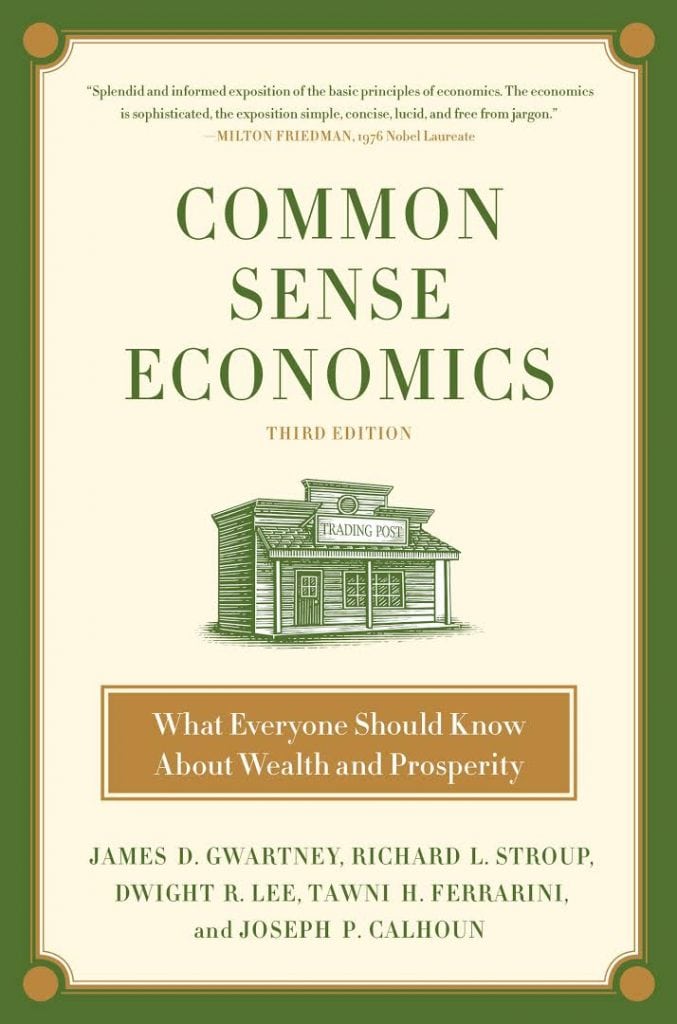 This book covers what you should know about wealth and prosperity.
This book covers what you should know about wealth and prosperity.
It was written by James D. Gwartney, Richard L. Stroup, and Dwight R. Lee. It offers a brief and organized understanding of economics.
It’s adapted for the beginner, novice, and experienced executive and lets them know the basic principles of economics. It also offers information on the impact of political policies and rules on individuals and nations.
Essentially, the book harmonizes the basic principles of economics and common sense. It teaches people to reason sensibly when it comes to matters economics. Common Sense Economics is written in clear, simple English that just about anyone can understand.
It brings out a strong message that economic progress stems from individual initiatives, competitive markets, and limited government role.
It offers the ABCs of how individuals create wealth in the world without having someone on top to police their activities. Individuals are at liberty to specialize, and by concentrating on what they are good at, everyone else benefits.
11. Free to Choose – Milton Friedman and Rose D. Friedman
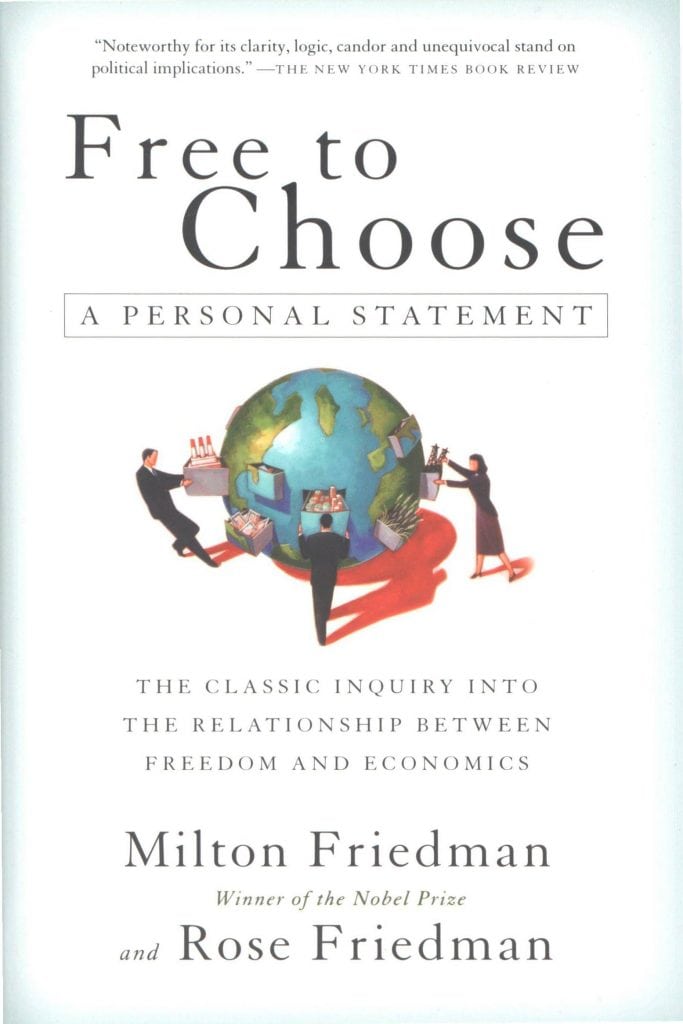 Free to Choose is one of the best economics books coauthored by renowned economists Milton Friedman and Rose D. Friedman. The book promotes free-market principles.
Free to Choose is one of the best economics books coauthored by renowned economists Milton Friedman and Rose D. Friedman. The book promotes free-market principles.
The twentieth-century world harbors tragic characteristics, such as ballooning budgets, expanding inflation, free taxation, endless assault against individualism, growing bureaucracy and productivity.
This book tackles these tragic characteristics and debunks the ignorance, myths, and clichés that engulf the welfare state.
The authors tell you that free market is the best form of economy. It enables optimum production and plays a crucial role in creating a free society. Free thinking leads to mushrooming of innovations and this can lead a nation to greater prosperity.
There is a great chapter that supports free trade and putting measures in place to control domestic and foreign trade. The chapter also points out that social welfare and other welfare systems are promises that may not see the light of the day.
It criticizes government schooling, labor unions and other regulatory bodies charged with the responsibility of cushioning the consumer.
The authors only dump their free market scenarios when you reach the chapter dealing with inflation and depression. They stick up for the Federal Reserve System (despite being a system the government uses to control the market), the sponsorship of the money supply by the central government, and the annual rate of inflation.
However, the authors have done a great job at diagnosing the blame of the central government. They also expose the greedy in the society like unions, rich business people and gluttonous Arab Sheiks who are responsible for inflation.
If you want to get to grips with economics and get your nose inside the workings of the central government, this is one of the best books to read.
Conclusion
Any effort to understand economics must start with understanding the basics. If you don’t understand the basics, you won’t understand its complexity.
These economics books enable a beginner or novice economist to know the ins and outs of economics and how they can apply it in real life scenarios. They are also useful to an experienced economist as they will help them refine their knowledge of economics and to stay current.
With these books, you can be sure that you’re getting top-notch economics knowledge because they are written by the best authors with extensive experience and expertise in the niche.








![Etoro Review – My Honest Opinion [+TUTORIALS]](https://foxytrades.com/wp-content/uploads/2018/03/Etoro-Review-100x70.jpg)

where’s marx and lenin
haha, sry for not including those guys
It is nice